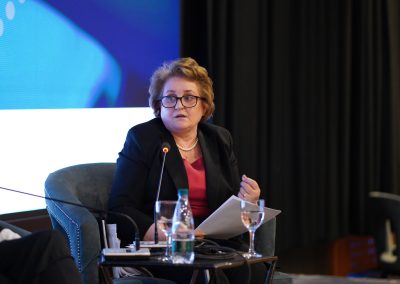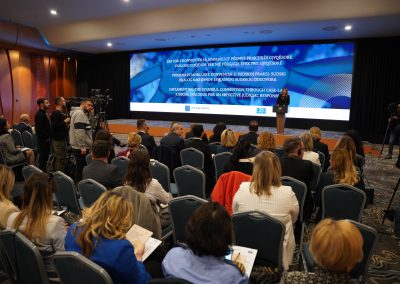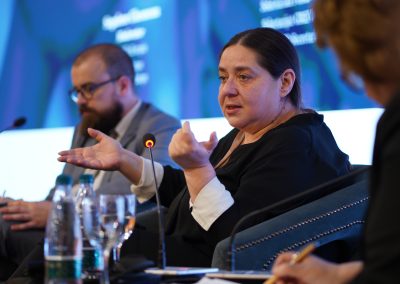15 March 2024
Between 2018 and 2022, twenty femicides and four attempted femicides were committed in Kosovo, and in almost all cases, the victims were killed by their husbands, it was stated in the report “Femicide in the Republic of Kosovo: Legal framework and judicial practice (2018–2022)”. This report, which was presented today at the conference “Implementing the Istanbul Convention through Case-Law: Judicial Dialogue for an Effective Judicial Response” in Pristina, contains an analysis of legislation and judicial practices, and provides important recommendations for the strengthening of the judicial response to femicide.
“From a constitutional and legal point of view, one can argue that the Constitution and the legislation of the Republic of Kosovo ― which includes the direct application of the Istanbul Convention ― is advanced enough to effectively prevent and fight violence against women including femicide”, said Selvete Gërxhaliu-Krasniqi, judge of the Constitutional Court of the Republic of Kosovo, and the author of this report.
“Nevertheless, as in all countries in Western Balkans and beyond, the main obstacle is the improper and/or insufficient implementation of said legislation. We remain committed that through legislation, empowered judiciary, continuous activities of civil society, media, and studies, such as those conducted by the AIRE Centre — the term femicide will one day be recognised by all as the wide-spread phenomenon it is, and which can no longer be hidden under general terms that mask its severe and broad presence”, explained judge Gërxhaliu-Krasniqi.
Focus of this report was on the analysis of the four final judgements in the cases pertaining to the murder of women between 2018 and 2022. While the punishments for these femicide were relatively high, the research has shown that these judgements, for the most part, did not adhere to the Sentencing Guidelines of the Supreme Court of the Republic of Kosovo on aggravating and mitigating circumstances, said Dr. Kosana Beker, lead gender equality expert of the AIRE Centre and editor of this report.
“Family and economic status, age, and remorse of the perpetrator were considered as mitigating circumstances, although they should not have been evaluated as such, considering the context of these cases. Additionally, the research showed that courts direct victims to pursue their claims for damages in civil proceedings, which is a practice that should be changed, as it can lead to unnecessary additional costs and revictimization of victims”, said Dr. Beker.
The recommendations of the report highlight the importance of the criminalisation of femicide, improvement of investigations, adoption of specific protocols, and enhancement of data collection to improve the prosecution of femicide and other forms of gender-based violence, and to ensure satisfactory justice for victims in accordance with relevant international instruments.
The report also emphasises the need for better implementation of existing legislative frameworks of the Republic of Kosovo, including the 2019 amendments to the Criminal Code, which introduce new circumstances for aggravated murder based on gender and/or gender identity. It also highlights the significance of the Law on Electronic Supervision of Persons Limited by Court Decisions which helps the enforcement of the protection orders, and consequently the prevention of femicide. The report also underscores the importance of the amendments to the Criminal Procedure Code, which sets shorter deadlines for investigation and completion of the main trial pertaining to the criminal offences of rape and domestic violence.
The report “Femicide in the Republic of Kosovo: Legal framework and judicial practice (2018–2022)”, produced by the AIRE Centre in collaboration with FemPlatz, and with the support of the Government of the United Kingdom, is available on the official website of the AIRE Centre.
The findings and recommendations of this publication have contributed to the development of a regional report on judicial practice in cases of femicide, as well as the development of expert training programs and other guidelines, ultimately aiming to lead to a more effective judicial response to cases of femicide and gender-based violence.




